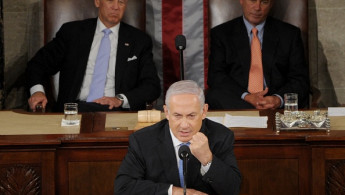Netanyahu says 'disappointed' Biden won't support ICC sanctions
Benjamin Netanyahu said in an interview broadcast Sunday he is "disappointed" US President Joe Biden won't pursue sanctions against the International Criminal Court, as its prosecutor seeks arrest warrants for the Israeli prime minister.
The US House of Representatives voted Tuesday to advance a largely symbolic bill calling for sanctions on the International Criminal Court after its prosecutor applied for an arrest warrant against Israeli Prime Minister Benjamin Netanyahu.
The US House's Illegitimate Court Counteraction Act -- backed by almost every Republican and around a fifth of the Democrats -- would bar US entry for ICC officials involved with the case, revoking their visas and restricting any US-based property transactions.
"The United States said that they would, in fact, in a bipartisan way, back the sanctions bill," Netanyahu said in an interview on Sirius XM radio, which was recorded on Wednesday -- before the latest Gaza truce plan emerged.
"I thought that was still the American position because there was a bipartisan consensus just a few days ago," he said.
"Now, you say there's a question mark. And frankly, I'm surprised and disappointed."
ICC prosecutor Karim Khan said last month that he was seeking warrants for Netanyahu and Israeli Defense Minister Yoav Gallant on suspicions of war crimes and crimes against humanity in Israel's war on Gaza.
Washington is not a member of the International Criminal Court, and has traditionally rejected its jurisdiction to issue warrants for US citizens, but has worked with the court on some issues as an observer.
Facing Republicans pushing for sanctions against the ICC in response, US Secretary of State Antony Blinken previously told Congress that "we want to work with you on a bipartisan basis to find an appropriate response."
While the White House has criticized the ICC, and Biden called the application for arrest warrants "outrageous," US National Security Council spokesman John Kirby later told reporters that sanctions were not "the right approach."
The Netanyahu interview was aired amid strained relations between Washington and its key Middle Eastern ally, though little has changed policy wise in terms of US support.
It was also recorded before Biden outlined a Gaza ceasefire deal Friday which immediately sparked further fissures between the US president and Israeli prime minister.
Biden had said Israel was offering a new roadmap towards a permanent peace in the embattled Palestinian territory, with the president outlining a three-phase proposal that would start with a six-week complete ceasefire.
Shortly after Biden's announcement, however, Netanyahu insisted his country would still pursue the war until it had reached all its goals.
The Israeli leader took issue with Biden's presentation of what was on the table, insisting on Friday the transition from one stage to the next was "conditional" and crafted to allow Israel to maintain its war aims.
Netanyahu reiterated that position on Saturday, saying that "Israel's conditions for ending the war have not changed: the destruction of Hamas's military and governing capabilities, the freeing of all hostages and ensuring that Gaza no longer poses a threat to Israel."




 Follow the Middle East's top stories in English at The New Arab on Google News
Follow the Middle East's top stories in English at The New Arab on Google News
![A group of Palestinians, foreign and Israeli activists gather to participated in an olive picking event on the land in the town of Battir, which is under threat of confiscation by Israel in Bethlehem, occupied West Bank on 8 November 2024. [Getty]](/sites/default/files/styles/image_330x185/public/2182930803.jpeg?h=199d8c1f&itok=__0LgGsa)

![People gathered around the rubble of destroyed houses to search for survivors [Getty]](/sites/default/files/styles/image_330x185/public/2024-11/GettyImages-2184733820.jpg?h=199d8c1f&itok=NiM1LO2f)